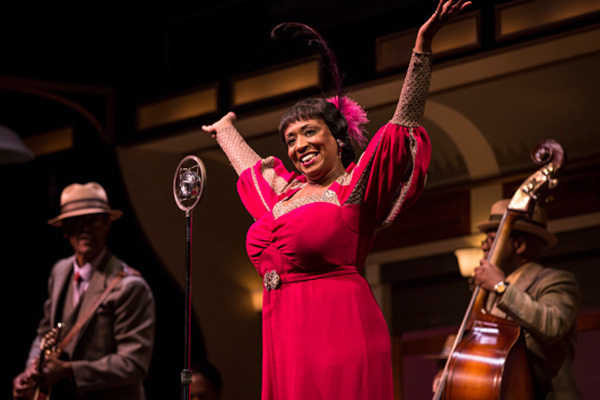
Photo: Courtesy of Goodman Theatre
E. Faye Butler plays Sister Juba in Pullman Porter Blues.
The powers that be might not have planned it as such, but there’s a rich synergy going on between Pullman Porter Blues, the Goodman Theatre’s season opener, and The Warmth of Other Suns, this year’s One Book/One Chicago selection.
In the latter, author Isabel Wilkerson writes about the Great Migration, when millions of Southern blacks made the arduous, often dangerous trek from south of the Mason Dixon Line to cities up north during the 20th century. Central to the stories Wilkerson tells in Suns is that of a Florida fruit picker who left the citrus groves and embarked on a decades-long career as a porter on the Pullman train line.
That narrative thread provides a fascinating context to playwright Cheryl L. West’s Pullman Porter Blues, a blues-infused, dramatic rendering of three generations of Pullman Porters, each working the eponymous rail line.
Directed by Chuck Smith, Pullman Porter Blues captures a detailed, engrossing slice of history as a grandfather, father, and son work the train line on a single night—June 22, 1937, the year “Brown Bomber” Joe Louis bested James Braddock for the title of heavyweight champion of the world.
Through Cephas Sykes (Tosin Morohunfola), a 19-year-old University of Chicago student working as a porter on summer break, his union activist father Sylvester Sykes (Cleavant Derricks), and his grandfather Monroe Sykes (Larry Marshall),
West deftly juxtaposes differing, and often contentiously opposing versions of the American Dream. The son of slaves, the elderly Monroe is grateful just to have one of the so-called good jobs for people of color. His son Sylvester wants far more—he aspires to be a conductor and bristles under working conditions that include 20-hour shifts, sleeping only in the train's smoking car, and loading heavy baggage. The teenage Cephas has been lured away from school by the promise of money, despite Sylvester’s avowal that his son will never suffer the indignities of being a Pullman Porter.
Arguably the cruelest indignity that surfaces during Pullman Porter Blues involves not one of the Sykes men but Sister Juba (E. Faye Butler), a larger-than-life blues singer who cloaks a profoundly traumatizing past with a regal bearing, an earthy vocabulary, and a healthy appetite for liquor. It’s Butler’s brassy, sassy performance that keeps Pullman Porter Blues running at full-throttle. Sister Juba’s musical numbers aren't always smoothly integrated into the narrative; they don’t advance the storyline so much as they enliven it. Still, Butler is a rowdy, bawdy powerhouse. Backed by a four-piece band (Anderson Edwards, Jmichael, Chic Street Man and Senuwell L. Smith), she belts out the blues with enough soul and energy to saturate the entire theater.
Riccadro Hernandez’s set design is a realistic stunner, a full-sized replica of a Pullman car resplendent with the gleaming brass rails and red velvet upholstery that gave the iconic line its reputation for luxury and glamour. Just as impactful are the projections Mike Tutaj juxtaposes with that well-appointed car: Superimposed with the plush interior, the brutal world of sharecroppers and slaves appears in stark black and white photographs. Coupled with the a cappella “Hezekiah’s Song”—a chant borne in the fields of the antebellum south—and performed by the Sykes men, Pullman Porter Blues offers an uncompromising reminder of the harsh reality existing beyond the posh surfaces of the Pullman cars.
The play does not travel especially new roads in its examination of racism, ambition, and the twined quests for dignity and security. But it does examine these issues with a dramatic flair that’s engrossing. And when Butler unleashes her powerhouse pipes, you can all but feel the roar of the train beating in your heart.
Pullman Porter Blues continues through Oct. 20 in the Albert Goodman Theatre, 170 N Dearborn. Tickets are $12.50–$74.50.


